CSES Seminar Series: John Padgett, University of Chicago
Linear Perspective in Florentine Art, Business, Politics, and Social Mobility.
Linear Perspective in Florentine Art, Business, Politics, and Social Mobility.
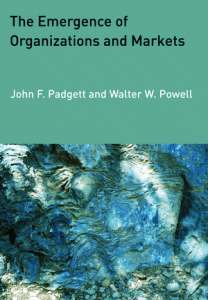
The social sciences have sophisticated models of choice and equilibrium but little understanding of the emergence of novelty. Where do new alternatives, new organizational forms, and new types of people come from? Combining biochemical insights about the origin of life with innovative and historically oriented social network analyses, John Padgett and Walter Powell develop a theory about the emergence of organizational, market, and biographical novelty from the coevolution of multiple social networks. They demonstrate that novelty arises from spillovers across intertwined networks in different domains. In the short run actors make relations, but in the long run relations make actors.
This theory of novelty emerging from intersecting production and biographical flows is developed through formal deductive modeling and through a wide range of original historical case studies. Padgett and Powell build on the biochemical concept of autocatalysis–the chemical definition of life–and then extend this autocatalytic reasoning to social processes of production and communication. Padgett and Powell, along with other colleagues, analyze a very wide range of cases of emergence. They look at the emergence of organizational novelty in early capitalism and state formation; they examine the transformation of communism; and they analyze with detailed network data contemporary science-based capitalism: the biotechnology industry, regional high-tech clusters, and the open source community.
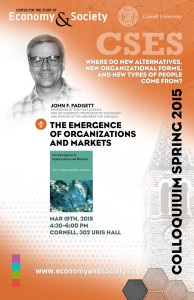
John F. Padgett is professor of political science and (by courtesy) professor of sociology and history at the University of Chicago. Walter W. Powell is professor of education and (by courtesy) professor of sociology, organizational behavior, management science, communication, and public policy at Stanford University.
The Center for the Study of Economy and Society at Cornell University was delighted to host a workshop on October 3rd, 2014 on the “Future of the Social Sciences” at the Cornell Club New York City. The format of the workshop was centered around discussion panels on 4 core themes and short background papers. The selected panels were structured around the following research areas: 1) Big Questions for the Social Sciences in the 21st Century, 2) Changes in Research Designs, 3) Blurring of Disciplinary Boundaries, and 4) Innovation, Change and Emergence.
The guest list for the Future of the Social Sciences workshop included the following scholars: Steven Strogatz, Francesca Trivellato, John Padget, Victor Nee, Barnaby Marsh, Duncan Watts, Russell Hardin, Sonja Opper, Siegwart Lindenberg, Delia Baldassarri, and Peyton Young.
Future of the Social Sciences: Introduction
Victor Nee, Cornell University
Barnaby Marsh, John Templeton Foundation
Future of the Social Sciences: Part 2
Russell Harding, New York University
Future of the Social Sciences: Part 3
Duncan Watts, Microsoft Research
Future of the Social Sciences: Part 4
Delia Baldassarri, New York University
Future of the Social Sciences: Part 5
Peyton Young, Oxford University
Future of the Social Sciences: Part 6
Steven Strogratz, Cornell University
Future of the Social Sciences: Part 7
Siegwart Lindenberg, University of Groningen
Future of the Social Sciences: Part 8
Sonja Opper, Lund University
Future of the Social Sciences: Part 9
Francesca Trivellato, Yale University
Future of the Social Sciences: Part 10
Victor Nee, Cornell University
Future of the Social Sciences: Part 11
John Padget, University of Chicago
Future of the Social Sciences: Conclusion
Victor Nee, Cornell University
Barnaby Marsh, John Templeton Foundation
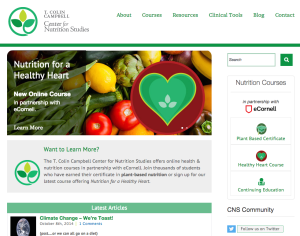
Nutrition, among professionals, suffers an identity crisis. Within the Academy, its professional reputation ranks very low and in the medical practitioner community, nutrition education is almost non-existent. The public, with an intense in nutrition, therefore is faced with massive confusion surrounding this topic. (Defined, nutrition is the biological expression of food upon consumption, digestion and absorption.)
In spite of this confusion, we now have compelling scientific evidence that properly understanding and applying nutrition can both prevent and treat (i.e., cure) many serious diseases and ailments. Heart disease, even when advanced, can be cured by food alone. The same nutrition strategy—a whole food, plant-based (WPB) diet, practiced as a lifestyle—avoids or treats many diseases and ailments and does so remarkably quickly. A composite of the most efficacious pills and procedures of contemporary medicine cannot compete with the right kind of food as a means of restoring health.This impressive evidence on nutrition, long suppressed by various cultural, economic and political forces, would greatly benefit from a healthy dose of scholarly discussion within the community of socio-political economists. Were this information made available to and properly used by the public, a case can easily be made that at least two-thirds of health care costs could be spared, environmental catastrophes could be substantially averted, and violence to humans and other sentient beings would be greatly reduced.
T. Colin Campbell was trained at Cornell (M.S., Ph.D.) and MIT (Research Associate) in nutrition, biochemistry and toxicology, then spent 10 years on the faculty of Virginia Tech’s Department of Biochemistry and Nutrition before being recruited at age 40 to the Division of Nutritional Sciences at Cornell in 1975 where he presently holds his Endowed Chair (now Emeritus). His principal scientific interests, begun in the late 1950’s, has been on the effects of nutritional status on long term health, particularly on the causation of cancer. His relatively large research program included both laboratory experimentation and nationwide human studies (China, Philippines) and was funded entirely by taxpayer funding (mostly NIH). Dr. Campbell has served on several expert committees on food and health policy development and has lectured extensively within and beyond the U.S., especially following his authorship of the best selling books The China Study (2005) (co-authored with Tom Campbell, MD) and Whole (2013). He is the recipient of many national and international awards, both in research and in citizenship.
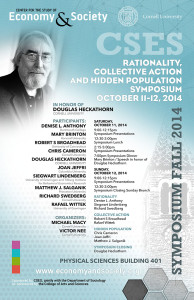
The Center for the Study of Economy & Society is delighted to co-sponsor the symposium on “Rationality, Collective Action and Hidden Population” to honor our colleague Douglas Heckathorn–who is beginning a phased retirement next year. The symposium will take place on October 11-12th, 2014 in the Physical Sciences Building 401.
Doug has made distinguished contributions to the social sciences in the course of an active career of research and teaching. Among his most notable accomplishments is the development of an innovative method for collecting data from hidden populations—from injection drug users to jazz musicians. Respondent Driven Sampling (RDS) combines incentivized methods for peer recruitment of respondents with innovative statistical procedures for obtaining unbiased estimates from a non-random sample. RDS is becoming widely used not only by social scientists but also by applied researchers in the fields of epidemiology and public health. Statisticians point to RDS as among the most important innovations in statistical sampling theory in recent decades.
The confirmed guest list for the symposium includes the following: Denise Anthony, Sigmund Lindenberg, Joan Jeffri, Matt Salganik, Richard Swedberg, Chris Cameron, Mary Brinton, Rafael Wittek, and Robert Broadhead. The symposium will begin at 9:00AM on Saturday, October 11th, 2014.
We know that Doug will feel honored by your participation in this event!
Kind regards,
Michael Macy and Victor Nee
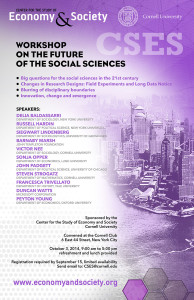
The Center for the Study of Economy and Society at Cornell University is delighted to host a workshop on October 3rd, 2014 on the “Future of the Social Sciences” at the Cornell Club New York City. The first Future of the Social Sciences conference was organized by Doug North at Washington University, and was followed by a second meeting convened in 2005 at the NYC Cornell Club. Participants of the second meeting on the Future of the Social Sciences conference included Doug North, Elinor Ostrom, Kevin McCabe, Duncan Watts, and John Cacioppo.
For the October 3rd, 2014 event, we have expanded our list to include scholars from Harvard, MIT, Columbia, Zurich, Lund, Oxford, Stanford, Yale, Princeton, Chicago, NYU, and Cornell. The format of the conference is centered around discussion panels on 4 core themes and short background papers (6-8 pages). The selected themes will be structured around the following timely areas: 1) Big Questions for the Social Sciences in the 21st Century, 2) Changes in Research Designs, 3) Blurring of Disciplinary Boundaries, and 4) Innovation, Change and Emergence. In addition to the core scholars, we have invited an audience of faculty, post-doctoral research associates, foundation leaders, and academic administrators from universities to attend the workshop. The panels will be videotaped for transmission to the broader scientific community through our CSES website and social media.
The confirmed guest list for the Future of the Social Sciences workshop includes the following scholars: Steven Strogatz, Francesca Trivellato, John Padget, Victor Nee, Barnaby Marsh, Duncan Watts, Russell Hardin, Sonja Opper, Siegwart Lindenberg, Delia Baldassarri, and Peyton Young. The event will begin at 9 AM on Friday, October 3rd, 2014 at the Cornell Club NYC located at 6 East 44th St, New York, NY 10017. We have scheduled for two panels before lunch and two panels after lunch–coffee and snacks will be provided during breaks.
If you are interested in attending the October 3rd, 2014 workshop, we have approximately 25 positions open and would be delighted to see you there. Please contact CSES@cornell.edu for availability.
We are pleased to present our CSES Lecture Series on April 17th, 2014 at Cornell University from 4:30 to 6PM in the A.D. White House, Guerlac Room. Monica Prasad presented her research “Is Neoliberalism Over?”
By neoliberalism I mean a set of policies built around a faith in the free market, and a strong distrust of state intervention. In the United States, we have witnessed a rise in policies of this sort in the last three decades, starting with the presidency of Ronald Reagan. In his first inaugural address Reagan said quote “government is not the solution to our problem; government is the problem”; in his lighter moments, Reagan’s joke was “The nine most terrifying words in the English language are: I’m from the government, and I’m here to help.” Reagan’s anti-government approach to government has been a stable presence in American politics ever since. We saw it catch fire again under the presidency of George W. Bush, and we have seen it flare up most recently in the rise of the Tea Party. But there are reasons to wonder whether this era of American neoliberalism might be drawing to a close. For example, nearly half of the American public now holds a negative image of the Tea Party and its extreme anti-government stance, compared with only a third who view it favorably. And Republicans have lost the popular vote in five of the last six presidential elections, and they hold one house of Congress today partly thanks to gerrymandering. So, has this era of American history come to a close? Is neoliberalism over?
Monica Prasad’s areas of interest are economic sociology, comparative historical sociology, and political sociology. Her book The Politics of Free Markets (University of Chicago Press, 2006) won the 2007 Barrington Moore Award from the American Sociological Assocation’s (ASA) section on comparative and historical sociology. Prasad has also published an edited volume on the sociology of taxation, co-edited with Isaac Martin and Ajay Mehrotra, called The New Fiscal Sociology: Taxation in Comparative and Historical Perspective (Cambridge University Press, 2009). Her most recent book is The Land of Too Much: American Abundance and the Paradox of Poverty (Harvard University Press, 2012), which has received three awards, including the 2013 Barrington Moore Award and the Viviana Zelizer Award from the ASA section on economic sociology. Prasad is the recipient of several awards including a Fulbright to the Institut d’Etudes Politiques in Paris in 2011 and a Frederick Burkhardt Residential Fellowship from the American Council of Learned Societies also in 2011. She received a National Science Foundation Faculty Early Career Development Award in 2009. With this funding, she and project manager Elisabeth Anderson are conducting a cross-national and longitudinal study of the relationship between income tax progressivity and welfare state spending. Prasad’s most recent book The Land of Too Much develops a demand-side theory of comparative political economy to explain the surprisingly large role of the state in the United States, its origins in the 19th-century revolution in agricultural productivity, and its consequences for undermining a European-style welfare state and leaving U.S. economic growth dependent on “mortgage Keynesianism.” She is currently researching a book manuscript on the Reagan-era tax cut of 1981 and conducting investigations into several aspects of taxation and development with graduate students.
We are pleased to present our CSES Lecture Series on March 27th, 2014 at Cornell University from 4:30 to 6PM in the A.D. White House, Guerlac Room. Marion Fourcade presented her research “Classification Situations: Life-Chances in the Neoliberal Era.”
This article examines the stratifying effects of economic classifications. We argue that in the neoliberal era market institutions increasingly use actuarial techniques to split and sort individuals into classification situations that shape life-chances. While this is a general and increasingly pervasive process, our main empirical illustration comes from the transformation of the credit market in the United States. This market works as both as a leveling force and as a condenser of new forms of social difference. The U.S. banking and credit system has greatly broadened its scope over the past twenty years to incorporate previously excluded groups. We observe this leveling tendency in the expansion of credit amongst lower-income households, the systematization of overdraft protections, and the unexpected and rapid growth of the fringe banking sector. But while access to credit has democratized, it has also differentiated. Scoring technologies classify and price people according to credit risk. This has allowed multiple new distinctions to be made amongst the creditworthy, as scores get attached to different interest rates and loan structures. Scores have also expanded into markets beyond consumer credit, such as insurance, real estate, employment, and elsewhere. The result is a cumulative pattern of advantage and disadvantage with both objectively measured and subjectively experienced aspects. We argue these private classificatory tools are increasingly central to the generation of “market-situations”, and thus an important and overlooked force that structures individual life-chances. In short, classification situations may have become the engine of modern class situations.
Marion Fourcade received her PhD from Harvard University (2000) and taught at New York University and Princeton University before joining the Berkeley sociology department in 2003. A comparative sociologist by training and taste, she is interested in variations in economic and political knowledge and practice across nations. Her first book, Economists and Societies (Princeton University Press 2009), explored the distinctive character of the discipline and profession of economics in three countries. She is now working on a second book, tentatively called Measure for Measure: Social Ontologies of Classification, which examines the cultural and institutional logic of what we may call “national classificatory styles” across a range of empirical domains. Current studies for this book include environmental valuation, the digitization of books and the classification of wines in France and the United States. Other ongoing research focuses on the role of the credit market in social stratification (with Kieran Healy); the comparative study of political organization (with Evan Schofer and Brian Lande); the microsociology of courtroom exchanges (with Roi Livne); and the role of business schools in the neoliberal turn (with Rakesh Khurana).
“Economic action is ‘social’ insofar as its subjective meaning takes account of the behavior of others and is thereby oriented in its course.”— Max Weber